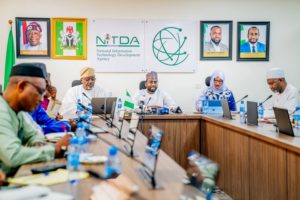

The Nigerian government has embarked on an ambitious project, led by the National Information Technology Development Agency (NITDA) and the Nigerian Financial Intelligence Unit (NFIU), to ensure the country exits the Financial Action Task Force (FATF) Grey List by May 2025. This landmark initiative aims to bolster financial integrity, combat illicit financial flows, and position Nigeria as a global leader in anti-money laundering and financial intelligence practices.
RELATED: Harnessing technology for economic growth: Insights from NITDA DG at Jigawa AI workshop
A Presidential Mandate for Financial Transformation
The project follows President Bola Ahmed Tinubu’s directive to develop and implement a robust Anti-Money Laundering/Counter Financing of Terrorism/Counter Proliferation of Firearms (AML/CFT/CPF) Data Management Framework and Platform. This system is designed to tackle Nigeria’s deficiencies in combating money laundering, terrorism financing, and arms proliferation financing, as well as address rising capital inflows into the country.
At the inaugural technical session held in Abuja, NITDA’s Director General, Kashifu Inuwa Abdullahi, described the initiative as a “milestone in Nigeria’s journey to exit the FATF Grey List,” which the country has been on since February 2013.
Challenges and Strategic Goals
The FATF Grey List designation stemmed from shortcomings in Nigeria’s anti-money laundering and counter-terrorism financing regimes. The new system aims to:
- Achieve FATF Compliance: Address gaps identified in Nigeria’s financial systems.
- Enhance Financial Data Management: Automate operations, integrate intelligence, and improve scalability.
- Strengthen Global Reputation: Restore international confidence and position Nigeria as a trusted financial partner.
- Combat Illicit Financial Flows: Provide real-time monitoring of financial transactions and track criminal networks.
- Foster Long-Term Operational Independence: Establish a sustainable framework for financial integrity.
Technology-Driven Innovation for Financial Integrity
Abdullahi emphasized that leveraging technology is critical to achieving these goals.
“This system will position Nigeria as a key player in the global effort to combat financial crimes, improve national security, and enhance our global reputation,” he said.
NFIU CEO, Barrister Hafsat Abubakar Bakari, described the project as a “game changer” that integrates technology into anti-money laundering practices to ensure credibility, transparency, and real-time data access.
She noted, “The Grey List is not a one-off project. The next evaluation cycle is in 2027, and we must sustain the gains we achieve to prevent regression.”
Legislative and Stakeholder Support
The initiative has received strong backing from the legislative arm. Chairman of the House Committee on Information and Communication Technology and Cybersecurity, Hon. Adedeji Olajide, pledged full legislative support, emphasizing the importance of collaboration between the executive and legislature to achieve the nation’s goals.
“Nigeria will reclaim its place as the giant of Africa, leveraging cutting-edge technology to strengthen financial intelligence and combat crime,” he affirmed.
Significance for Nigeria’s Digital Economy and Global Standing
The project aligns with Nigeria’s broader agenda of leveraging innovation and technology to combat corruption and foster economic growth. It aims to secure Nigeria’s removal from the FATF Grey List, restore global confidence, and position the nation as a benchmark for financial intelligence in Africa and beyond.





























